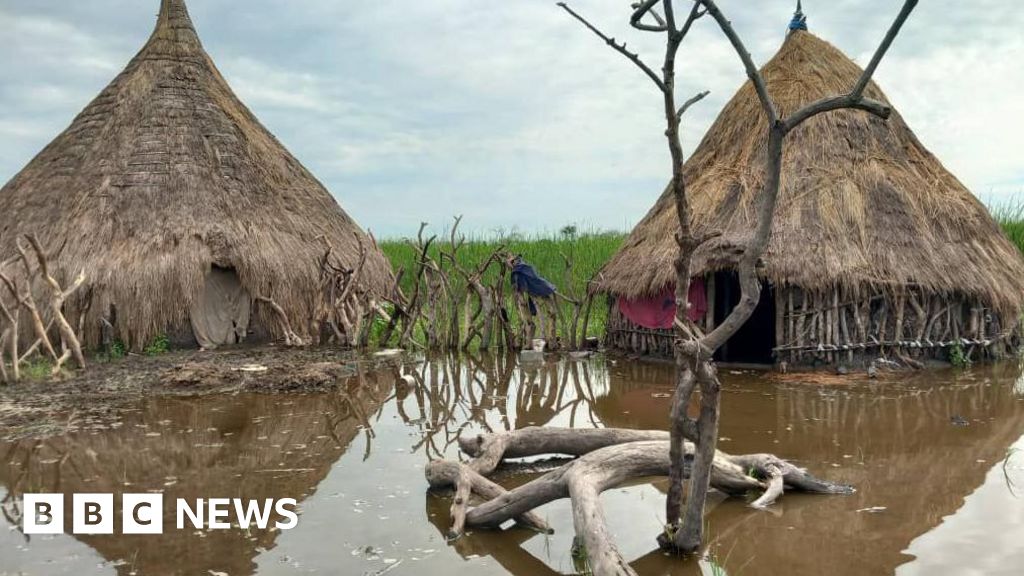A million people affected by rising waters

Over a million people in South Sudan have been affected by floods across much of the country, the UN’s humanitarian organisation, Ocha, has said.
More than a quarter of those – many in the north – have been forced from their homes by rising waters.
Ocha said the displaced were seeking refuge on higher ground, but the rains have also meant that getting aid to those who need it had become increasingly difficult.
This is one of the worst flood seasons that South Sudan – a country with a population of more than 11 million people – has experienced in recent decades.
In Pibor, in the east, 112,000 people have lost their homes, according to a government relief agency there.
Those who have fled to higher ground “don’t even have food, they left everything in that previous location”, Joseph Nyao, director of Relief and Rehabilitation told the BBC from Pibor.
He added that the government was urging people in areas threatened by floods to “immediately move to higher grounds that have been identified by local authorities for their safety”.
“The level of water is still increasing and the displacement is continuing.”
In May, the government alerted the international community to the risk of exceptional floods that were expected to hit the country in the subsequent months.
Ocha said that since the rains began 15 major supply routes have been rendered impassable, affecting the delivery of essential humanitarian aid to some 500,000 people in different parts of the country.
This all comes as South Sudan continues to deal with the impact of the 18-month civil war in neighbouring Sudan.
More than half a million Sudanese refugees and returnees from South Sudan have been registered in South Sudan since April last year.
South Sudan, already in the throes of a worsening humanitarian situation, is seeing its ability to respond become further overstretched, Ocha warned.
#million #people #affected #rising #waters
News plays a pivotal role in our lives by keeping us informed and connected to the world. It serves as a critical source of information, offering updates on current events, politics, economics, science, and more. Through news, we gain awareness of global issues and local developments, helping us make informed decisions in our personal and professional lives. News also fosters discussion and debate, encouraging critical thinking and perspective-taking. Moreover, it promotes transparency and accountability among governments, businesses, and other institutions. In a rapidly changing world, staying updated with the news enables us to adapt to new challenges and opportunities, shaping our understanding of the complexities of society. Ultimately, news is not just about information; it empowers us to participate actively in the world around us, contributing to a more informed, engaged, and responsible global citizenry.
Health is fundamental to our well-being and quality of life, making it an essential aspect of daily existence. It encompasses physical, mental, and emotional aspects, influencing our ability to function effectively and enjoy life fully. Prioritizing health allows individuals to maintain optimal physical fitness, reducing the risk of diseases and promoting longevity. Mental health, equally crucial, affects our cognitive abilities, emotional stability, and overall happiness. Investing in preventive healthcare through exercise, balanced nutrition, and regular medical check-ups helps in early detection of potential health issues, ensuring timely intervention and treatment. Beyond individual benefits, a population’s health impacts societal productivity and economic stability. Governments and organizations worldwide emphasize public health initiatives to address pandemics, health disparities, and promote overall well-being. Ultimately, health serves as the foundation upon which we build our lives, influencing our ability to pursue goals, nurture relationships, and contribute meaningfully to society.
Money plays a crucial role in our lives as a means of financial security and freedom. It enables us to meet basic needs such as food, shelter, and healthcare, while also providing opportunities for education, travel, and personal growth. Beyond material comforts, money facilitates social connections and experiences that enrich our lives. It empowers individuals to invest in their futures, whether through savings, investments, or entrepreneurial ventures, thereby fostering economic stability and growth. However, the pursuit of wealth should also be balanced with ethical considerations, as money can influence relationships and societal dynamics. Responsible management of finances is key to achieving long-term goals and mitigating financial stress. Ultimately, while money is a tool for achieving aspirations and fulfilling desires, its true value lies in how it is utilized to improve both personal well-being and the broader community.
Earning Easy Money in 2024: Opportunities and Considerations 💸
In 2024, the landscape of earning easy money presents diverse opportunities, albeit with considerations. The digital age offers platforms for freelancing, online trading, and e-commerce, allowing individuals to leverage skills and creativity for financial gain. Cryptocurrency investments continue to allure with potential for quick profits, yet they entail high volatility and risk. Moreover, the rise of the gig economy enables flexible work arrangements through apps and websites, offering quick payouts but often without job security or benefits. Passive income streams such as rental properties and investments in stocks or bonds remain viable, but demand initial capital and ongoing management. Amid these options, caution is essential to avoid scams and unsustainable ventures promising overnight success. Ultimately, while the allure of easy money persists, informed decisions, diligence, and a long-term perspective are crucial for sustainable financial growth and security in the dynamic year ahead.





